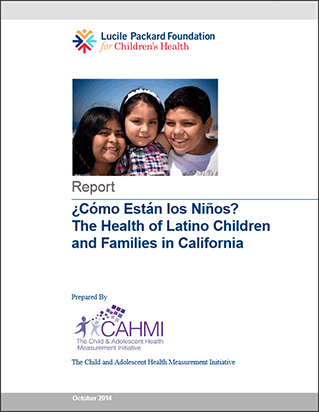New Study of California's Latino Children Finds Striking Differences in Health and Well-being Within 4.7 Million-and-Growing Population
A comprehensive new study finds that while more Latino children in California live in poverty, are uninsured and have higher rates of obesity than their white counterparts, Latino children have comparable access to preventive health care and most of their parents report them as being in “good” or “excellent” health.
However, study researchers also found that Latino children living in “linguistically isolated” families, where Spanish is primarily spoken, face far greater challenges in health access and educational achievement compared to children in families where both English and Spanish are spoken.
See the full study>>
The study, conducted by researchers from the university-based Child and Adolescent Health Measurement Initiative and commissioned by the Lucile Packard Foundation for Children's Health, finds striking differences within a 4.7 million-strong population that comprises more than half of all the children in the state.
The researchers examined data on physical health, as well as on family, school and neighborhood environments, to create a picture of the current status of Latino children in the state.
The study is intended to provide data for policymakers and advocates working both to improve the current health and well-being of Latino children and to ensure a healthy future population for California.
Among the key findings:
- More than 94% of Latino children in California are U.S. citizens.
- More than 370,000 Latino children in the state have no health insurance, despite being eligible for government-funded programs. Undocumented immigrants may avoid enrolling their children, the majority of whom are U.S. citizens, in these programs out of fear their immigration status will be discovered in the process. Limited English proficiency may also contribute to a lack of understanding about eligibility and the enrollment process.
- One in four Spanish-speaking households in California is considered "linguistically isolated," meaning that no one in the household age 14 or older is conversant in English. Spanish-speaking parents of young children may have difficulty navigating and engaging in their child’s school and the health care system, resulting in increased health risks for their children.
- More than 30% of Latino children from linguistically isolated (primarily Spanish-speaking) households live in a "working poor" household, with parents who have incomes less than 100% of the federal poverty level despite full-time employment.
- About 58% of Latino children from linguistically isolated households use a community or government clinic or a community hospital as a usual source of care, a much higher rate of use than white children (15.3%) or Latino children from English-speaking households (17.9%).
- Latino children fare as well or better than white children when it comes to family practices that indicate a home environment that promotes children's health. For example, Latino children from primarily Spanish-speaking households reportedly eat meals together with their family every day more often than white children, and are more likely than white children to live in a household where no one smokes.
The California findings are largely consistent with those of a recently released national study of Latino children, which noted lower rates of health insurance among Latino children compared to white children and raised concerns about persistent health disparities, but also highlighted solid gains in educational achievement.
Helpful Links
Kidsdata.org: Data on Latino Children in California
America's Hispanic Children: Gaining Ground, Looking Forward, Child Trends
NCLR/CSULB Center for Latino Community Health, Evaluation, and Leadership Training
Latino Coalition for a Healthy California
National Latino Children's Institute
Kidsdata Tip
Our short tutorial videos cover how to find the data you need, tailor the data format for your needs, export data for analysis and communicate your data in reports, presentations, proposals, social media and more. More information>>
|

|

